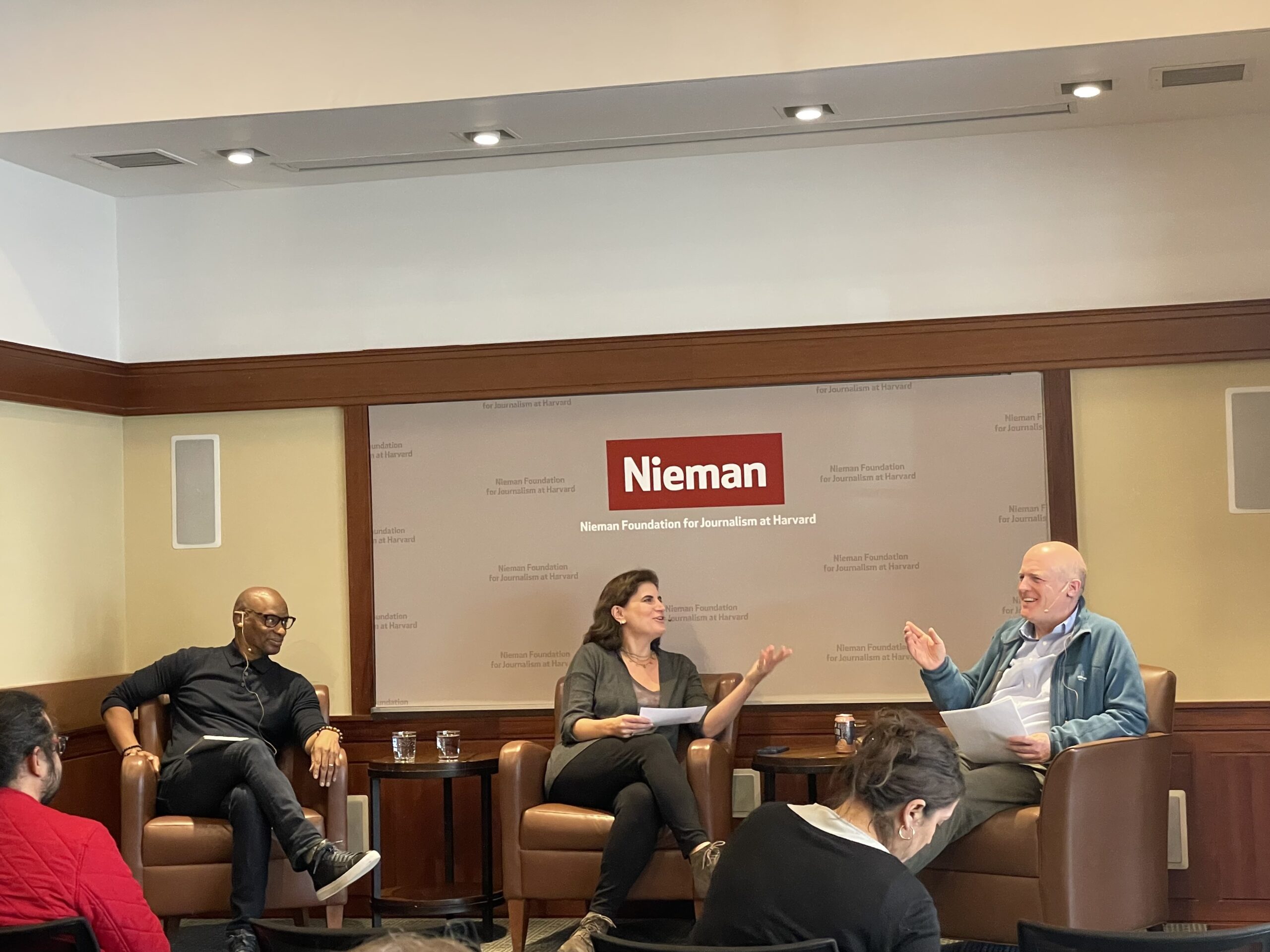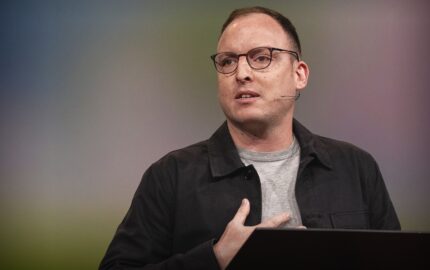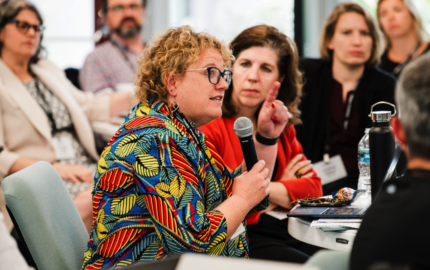Daniel P. Schrag is the Sturgis Hooper Professor of Geology at Harvard University, professor of environmental science and engineering, and director of the Harvard University Center for the Environment. He studies climate and climate change over a broad range of Earth’s history, particularly how information on climate change from the geologic past can lead to better understanding of anthropogenic climate change in the future. In addition to his work on geochemistry and climatology, Schrag studies energy technology and policy, including carbon capture and storage and low-carbon synthetic fuels. From 2009 to 2017, Schrag served on President Barack Obama’s Council of Advisors on Science and Technology.
Schrag spoke to Nieman Fellows in March on how the media could adopt more honest messaging about climate change, the limitations of climate optimism, and how society can adapt to climate change. Edited excerpts:
On the obstacles to solving climate change
One of the things you hear from a lot of advocates is this is the most urgent problem of our time. I've been thinking about that statement for a long time. I always think that's exactly backwards. Climate change is probably the hardest problem of our time. It's the most difficult problem of our time, but it's the most difficult problem, partly because it's actually never urgent. That's why it's so difficult.
I would argue that it comes from the confluence of two aspects of climate change that are really important and fundamental. One is that it is a global problem, and it's a global collective action problem. It's a global collective action problem that's not equal. It doesn't mean that every place counts the same. Global collective action is really hard. Humans are bad. We're tribal. We're nationalistic. We don't do globally terribly well.
The other aspect is long timescales. Almost every aspect of climate change has really long timescales. In my class, we talk about timescale with the oceans in century to millennia, timescales of ice sheets moving, which is centuries to millennia to tens of millennia, the timescale of the carbon cycle, which is tens of millennia to hundreds of millennia — incredibly long timescales.
In our world, we have trouble dealing with things that are six months ahead, much less 100 years, much less 10,000 years. Yet we are making decisions today that will affect the earth for tens of thousands of years. How do you get your head around that? How do you make global decisions on a global problem that has timescales like that? Surprise, surprise, we're not doing a very good job.
The long timescales mean that in some ways it never feels urgent. That isn't to say it isn't urgent. I want to be clear. A few years ago, a first‑year undergraduate in my class came up to me and was like, "How can you say it's not urgent? It's so urgent." It is urgent. It is urgent to me. I see the urgency on this.
From individual perspectives, rational individuals all over the world, climate change probably shouldn't be at the top of your list of worries of all the things to worry about in the world, for good reason. That's why it's so hard to get collective action on this because it's never at the top of anybody's list.
On climate optimism
It has to do with the framing of this problem by the media, by the environmental movement, by politicians. [They say] “Can we please end with some good news?” There's a whole branch of the climate change movement that are climate optimists. They're dedicated to talking about the good news about climate change. “We can't let people despair. We need to tell them good things. We need to empower them. We need to tell them things that will motivate them to fight.” My problem is, I'm a scientist. That sounds a lot like manipulation. Telling people things that aren't true, because you want them to do something — isn't that problematic?
For example, when a lot of environmental NGOs say, “Oh my God, we have 10 years to do something about climate change, otherwise it's game over.” There are many versions of this, but it's essentially like we're going to go over a cliff in 10 years. “If we act now, we still can save everything.” Both of those are lies. There is no cliff we know of. It gets worse and worse, and therefore, there's never a time when it's not worth doing something. It's always worth stopping the damage from getting worse.
It's also not true that we can save everything and everything's going to be OK if we act now because the timescales in the system and the stuff we've already done has led to this huge problem with enormous inertia. The timescales of the energy system of the world are probably closer to centuries than decades.
I want to read for you the IPCC press release. For those of you who don't know, the IPCC is the Intergovernmental Panel on Climate Change, which is a committee of mostly scientists, although there are some economists too, who every five or six years put together a big report on climate change.
This is their press release from April 2022, so a little less than a year ago: “The evidence is clear. The time for action is now. We can halve emissions by 2030.” We can halve emissions by 2030? Maybe with global nuclear war, but I don't know another way to do it. This is insane, but they say it.
I think that optimism is delusional. I understand that politicians set ambitious, concerned goals. That's what politicians do. In 2020, [we] had a presidential election. They were asked, “If you are president, when will the U.S. get to net zero?” The honest answer to that question by the candidates, and nobody said this, is “I have no idea when we're going to get to net zero. Here's what we're going to do to try to make this possible.” None of them said that. Instead, they used the number and the year, as a metric for how much they care about climate change. Bernie Sanders said 2030. Elizabeth Warren said 2040. Joe Biden was the laggard, he said 2050.
What troubles me is that we have confluence of environmental groups and the media who are echoing those goals as if they're not understanding that these are totally absurd.
I don't want to say it's absolutely impossible that we could shut off our CO2 emissions, just, it looks pretty remote right now to me.
On more honest messaging about climate change
I feel like I have an obligation to tell the truth as a scientist and describe the world as accurately as I can without bias.
What I see in the IPCC and environmental NGOs is people adjusting what they're saying because they want people to have hope. They want people to feel a certain way. They want people to act a certain way, and I'm troubled by that. I don't know what the right answer is, but I'm really troubled by that.
I try to thread this into [my] classes. I'm brutally honest in class, but at the same time, I am hopeful. It's hard. It's like walking a tightrope.
This is something I've been talking about with my friends Terry Tempest Williams at the [Harvard] Divinity School and Matthew Potts, who's the Pusey Minister at Memorial Church. When you're a chaplain working at hospital and you're asked to talk to a family or a patient who's just been given a horrible diagnosis — cancer or some terrible disease — you don't pat them on the back, and say “Everything's going to be OK.” In fact, you're trained not to do that.
That's just really a bad idea because everything's not going to be OK. What you actually are trained to do is talk with them about confronting the reality and still trying to live your life in the most purposeful, richest way possible, whatever comes.
To me, that's a much more honest and accurate way of dealing with climate change as opposed to trying to change the message to a community of the public, who really don't understand the phenomena. This is where journalism matters so much.
On adaptation
I think acting to protect yourself is a much more selfish act and easier to convince people to do, than to reduce your emissions [as] part of a global effort. You may not buy that, but I think that's true. As people work to protect themselves, they learn about the problems, they learn about the risks.
What we argued in this report was that over time, people are more willing to support policy action, legislation, whatever, that is focused on the emissions side, if you actually focus on adaptation. Gradually, people get more interested in actually fixing the problem.
There's another aspect of hope, which is I think we've barely scratched the surface of adaptation. Part of the NGO environmental movement line about we're going to go over a cliff in 10 years — what bothers me is that actually there are many things that are tragic about climate change, but the fact is most humans are going to be just fine. Unfortunately, there will be poor people, many, many poor people around the world who will suffer terribly.
Frankly, being poor in this world, you suffer pretty much already. It's not like it's glamorous to be among the two or three billion poorest people in the world right now. If we're talking about how climate change is going to exacerbate that, no question it will.
I think we're going to be innovative in agriculture and we'll be innovative in architecture. We're going to be innovative in all sorts of things not because we're brilliant but because we're up against it.
I'll give you a great example [of adaptation]. In Bangladesh in 1991, there was a hurricane, a cyclone, that came ashore and killed 130,000 people. Three years later, 1994, the same hurricane — same storm, had the same track, it was the same size, it was almost the exact same location — something like 800 people died. What happened? It turned out there were two main things.
One was that there was an early warning system that had been set up so people knew about it and could prepare. The second was that the government built a whole bunch of bunkers and shelters. People went to shelters.
OK, still 800 people died, that's tragic, but that's like 130,000 people who didn’t. That's a huge success story.
This wasn't $100 billion piece of infrastructure or [even] $10 billion piece of infrastructure. This was millions of dollars spent on some shelters, concrete shelters. This wasn't rocket science. That's adaptation.



